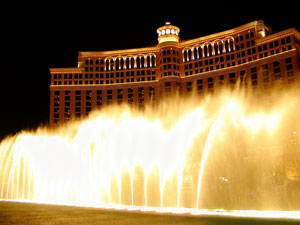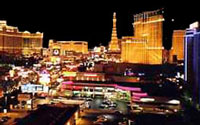
Early History of Las Vegas, Nevada - Casinos
Part 1 ? Brief History of Las Vegas
Las Vegas Gambling and Las Vegas Casinos - Or click here for a List of Las Vegas Casinos
Less than a century ago, it would have been hard for anybody to believe that the place that is Las Vegas, Nevada today would become one of the most popular cities in the United States. The only time people ever used the term "the strip" back then was when it concerned mining! Although underground springs did afford this area more vegetation and water than the desert that surrounded it, the valley where Las Vegas is located was still seen as just a pleasant place to stop and rest for explorers and settlers. The name "Las Vegas" means "The Meadows"; aptly named for the valley's reputation for being an oasis in the middle of the Mojave Desert. The Paiute Indians were the only permanent residents of the valley, until Mormon leader Brigham Young sent missionaries to build a fort and settle there in 1855.
The goal of the missionaries who were sent to the Las Vegas valley was to convert the Paiute Indians to Christianity. It is particularly ironic that the native Indians were less interested in listening to the Mormon missionaries than in playing a roulette-style gambling game in the sand with sticks and bones. Little did the Indians know that their games were the precursor to what was to become of this valley in the future!
Eventually the Las Vegas valley became a place populated mainly by miners and farmers, and 110 acres of the valley became the city of Las Vegas in 1905. The population grew slowly but steadily, and the town stayed small and fairly insignificant until things started to change in the early 1930's.
Enter the legalization of gambling in the state of Nevada on March 19th, 1931. Gambling was not new to the United States; poker, blackjack and craps were already popular games that were played in bars, hotels, and gambling houses throughout the country until gambling became illegal in most states, including Nevada, in the early 1900's. Even then gambling just went underground, and continued to be a favoured pastime for many people.
The re-legalization of gambling in Nevada became the springboard for the beginning of the transformation of Las Vegas into the gambling paradise that we know today. In 1941, a mobster named Meyer Lansky convinced famed mobster Bugsy Siegel to look at the town of Las Vegas as a place to build hotels and gambling houses, or casinos, and to eventually make it a city that was focused primarily on gambling. The idea was to have the Mob build and therefore control most of the hotels and casinos, and subsequently reap most of the profits generated from the city. Reluctant at first, Siegel soon became enthusiastic about the idea. With generous financial backing from the Mob, Siegel built the Flamingo Hotel and Casino, and the reputation of Las Vegas as a one-of-a-kind gambling mecca began. The pastime of playing poker, blackjack, craps and slot machines took on a whole new meaning as gambling was on its way to becoming a million-dollar industry.
 Siegel was eventually murdered by the Mob for skimming profits, but Las Vegas continued to grow at a rapid pace, with hotels and casinos springing up all over the valley. State officials tried in vain to keep the Mob from controlling the majority of the gambling in Las Vegas, but for awhile it was a lost cause. Many stories have been written and many movies have been made about the history of the Mob in Las Vegas. There were turf wars and disputes among many famous mobsters who owned and controlled the hotels and casinos, and for a while murder, beatings, and kidnappings were not uncommon events in the once-small town.
Siegel was eventually murdered by the Mob for skimming profits, but Las Vegas continued to grow at a rapid pace, with hotels and casinos springing up all over the valley. State officials tried in vain to keep the Mob from controlling the majority of the gambling in Las Vegas, but for awhile it was a lost cause. Many stories have been written and many movies have been made about the history of the Mob in Las Vegas. There were turf wars and disputes among many famous mobsters who owned and controlled the hotels and casinos, and for a while murder, beatings, and kidnappings were not uncommon events in the once-small town.
Although the hotels and casinos in Las Vegas were not owned exclusively by the Mob, they continued to have a substantial influence in the city's gambling industry until the early 1980's. Eventually the FBI decided that enough was enough, and a campaign to eradicate Mob influence from the ever-growing city was undertaken. The FBI won out, and the lawlessness and corruption that once infiltrated the city, if mostly behind the scenes, gave way to the legally corporate-owned and operated Tinsel Town that continues to this day.
Many of the most famous hotels and casinos in Las Vegas were built side by side on Las Vegas Boulevard, which eventually came to be known as "The Strip". Arguably the most well lit street in the United States, the strip is certainly one of the most famous. On these 3 miles of road, some of the oldest and most famous casinos and hotels can be found.
Extravagance and uniqueness became the rule of the day when planning and building a hotel and casino in Las Vegas. Competition for patrons was fierce, and planners and builders were free and almost obligated to use their imaginations to the fullest extent. Caesars Palace was built on the Las Vegas Strip in the early 1960's, and was touted as one of the most impressive and lavish casinos of its day. Built in an ancient Roman style, Caesars Palace boasted large Roman columns, statues of ancient Roman soldiers and rows of spraying fountains on the grounds in front of the casino. Inside the casino, personnel in full Roman costume greeted patrons. Although there have been some changes and improvements, Caesars Palace has kept its main theme alive, and is still one of the most popular hotels and casinos today.
Las Vegas hotel and casino owners began to see the advantage early on of adding other types of entertainment besides gambling, and it didn't take long for the city to become a place to see famous entertainers performing on just about any night of the year. With shows, concerts, and sports events year-round, Las Vegas has become known as much for its entertainment as for it?s gambling.
The owners of the hotels and casinos in Las Vegas learned over the years that they could cater to just about everyone and reap huge rewards; from the sweet little old lady who plays nickel slot machines all day, to the high-rolling CEO from Texas who plays $1000 a hand poker. Built on the premise of having "something for everyone", the continuing success of the former little desert city cannot be questioned.
Read Las Vegas Casinos part II of this story...
|